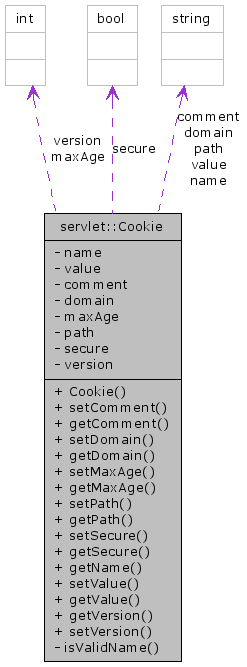servlet::Cookie Class Reference
#include <Cookie.h>

Public Member Functions | |
| Cookie (const std::string &name, const std::string &value) | |
| void | setComment (const std::string &purpose) |
| std::string | getComment () const |
| void | setDomain (const std::string &pattern) |
| std::string | getDomain () const |
| void | setMaxAge (int expiry) |
| int | getMaxAge () const |
| void | setPath (const std::string &uri) |
| std::string | getPath () const |
| void | setSecure (bool flag) |
| bool | getSecure () const |
| std::string | getName () const |
| void | setValue (const std::string &newValue) |
| std::string | getValue () const |
| int | getVersion () const |
| void | setVersion (int v) |
Private Member Functions | |
| bool | isValidName (const std::string &value) const |
Private Attributes | |
| std::string | name |
| std::string | value |
| std::string | comment |
| std::string | domain |
| int | maxAge |
| std::string | path |
| bool | secure |
| int | version |
Detailed Description
Creates a cookie, a small amount of information sent by a servlet to a Web browser, saved by the browser, and later sent back to the server. A cookie's value can uniquely identify a client, so cookies are commonly used for session management.A cookie has a name, a single value, and optional attributes such as a comment, path and domain qualifiers, a maximum age, and a version number. Some Web browsers have bugs in how they handle the optional attributes, so use them sparingly to improve the interoperability of your servlets.
The servlet sends cookies to the browser by using the servlet::HttpServletResponse#addCookie method, which adds fields to HTTP response headers to send cookies to the browser, one at a time. The browser is expected to support 20 cookies for each Web server, 300 cookies total, and may limit cookie size to 4 KB each.
The browser returns cookies to the servlet by adding fields to HTTP request headers. Cookies can be retrieved from a request by using the servlet::HttpServletRequest#getCookies method. Several cookies might have the same name but different path attributes.
Cookies affect the caching of the Web pages that use them. HTTP 1.0 does not cache pages that use cookies created with this class. This class does not support the cache control defined with HTTP 1.1.
This class supports both the Version 0 (by Netscape) and Version 1 (by RFC 2109) cookie specifications. By default, cookies are created using Version 0 to ensure the best interoperability.
- Version:
- $Version$
Definition at line 102 of file Cookie.h.
Constructor & Destructor Documentation
| servlet::Cookie::Cookie | ( | const std::string & | name, | |
| const std::string & | value | |||
| ) |
Constructs a cookie with a specified name and value.
The name must conform to RFC 2109. That means it can contain only ASCII alphanumeric characters and cannot contain commas, semicolons, or white space or begin with a $ character. The cookie's name cannot be changed after creation.
The value can be anything the server chooses to send. Its value is probably of interest only to the server. The cookie's value can be changed after creation with the setValue method.
By default, cookies are created according to the Netscape cookie specification. The version can be changed with the setVersion method.
- Parameters:
-
name a Stringspecifying the name of the cookievalue a Stringspecifying the value of the cookie
- Exceptions:
-
IllegalArgumentException if the cookie name contains illegal characters (for example, a comma, space, or semicolon) or it is one of the tokens reserved for use by the cookie protocol
- See also:
- setValue
Definition at line 63 of file Cookie.cpp.
References isValidName().

Member Function Documentation
| std::string servlet::Cookie::getComment | ( | ) | const [inline] |
Returns the comment describing the purpose of this cookie, or null if the cookie has no comment.
- Returns:
- a
Stringcontaining the comment, ornullif none
- See also:
- setComment
Definition at line 184 of file Cookie.h.
References comment.
| std::string servlet::Cookie::getDomain | ( | ) | const [inline] |
| int servlet::Cookie::getMaxAge | ( | ) | const [inline] |
Returns the maximum age of the cookie, specified in seconds, By default, -1 indicating the cookie will persist until browser shutdown.
- Returns:
- an integer specifying the maximum age of the cookie in seconds; if negative, means the cookie persists until browser shutdown
- See also:
- setMaxAge
Definition at line 268 of file Cookie.h.
References maxAge.
| std::string servlet::Cookie::getName | ( | ) | const [inline] |
| std::string servlet::Cookie::getPath | ( | ) | const [inline] |
| bool servlet::Cookie::getSecure | ( | ) | const [inline] |
| std::string servlet::Cookie::getValue | ( | ) | const [inline] |
| int servlet::Cookie::getVersion | ( | ) | const [inline] |
Returns the version of the protocol this cookie complies with. Version 1 complies with RFC 2109, and version 0 complies with the original cookie specification drafted by Netscape. Cookies provided by a browser use and identify the browser's cookie version.
- Returns:
- 0 if the cookie complies with the original Netscape specification; 1 if the cookie complies with RFC 2109
- See also:
- setVersion
Definition at line 412 of file Cookie.h.
References version.
| bool servlet::Cookie::isValidName | ( | const std::string & | value | ) | const [private] |
| void servlet::Cookie::setComment | ( | const std::string & | purpose | ) | [inline] |
Specifies a comment that describes a cookie's purpose. The comment is useful if the browser presents the cookie to the user. Comments are not supported by Netscape Version 0 cookies.
- Parameters:
-
purpose a Stringspecifying the comment to display to the user
- See also:
- getComment
Definition at line 170 of file Cookie.h.
References comment.
| void servlet::Cookie::setDomain | ( | const std::string & | pattern | ) | [inline] |
Specifies the domain within which this cookie should be presented.
The form of the domain name is specified by RFC 2109. A domain name begins with a dot (.foo.com) and means that the cookie is visible to servers in a specified Domain Name System (DNS) zone (for example, www.foo.com, but not a.b.foo.com). By default, cookies are only returned to the server that sent them.
- Parameters:
-
pattern a Stringcontaining the domain name within which this cookie is visible; form is according to RFC 2109
- See also:
- getDomain
Definition at line 208 of file Cookie.h.
References domain.
Referenced by container::HttpServletRequestImpl::parseCookieHeader().
| void servlet::Cookie::setMaxAge | ( | int | expiry | ) | [inline] |
Sets the maximum age of the cookie in seconds.
A positive value indicates that the cookie will expire after that many seconds have passed. Note that the value is the maximum age when the cookie will expire, not the cookie's current age.
A negative value means that the cookie is not stored persistently and will be deleted when the Web browser exits. A zero value causes the cookie to be deleted.
- Parameters:
-
expiry an integer specifying the maximum age of the cookie in seconds; if negative, means the cookie is not stored; if zero, deletes the cookie
- See also:
- getMaxAge
Definition at line 250 of file Cookie.h.
References maxAge.
| void servlet::Cookie::setPath | ( | const std::string & | uri | ) | [inline] |
Specifies a path for the cookie to which the client should return the cookie.
The cookie is visible to all the pages in the directory you specify, and all the pages in that directory's subdirectories. A cookie's path must include the servlet that set the cookie, for example, /catalog, which makes the cookie visible to all directories on the server under /catalog.
Consult RFC 2109 (available on the Internet) for more information on setting path names for cookies.
- Parameters:
-
uri a Stringspecifying a path
- See also:
- getPath
Definition at line 293 of file Cookie.h.
References path.
Referenced by container::HttpServletRequestImpl::parseCookieHeader().
| void servlet::Cookie::setSecure | ( | bool | flag | ) | [inline] |
Indicates to the browser whether the cookie should only be sent using a secure protocol, such as HTTPS or SSL.
The default value is false.
- Parameters:
-
flag if true, sends the cookie from the browser to the server only when using a secure protocol; iffalse, sent on any protocol
- See also:
- getSecure
Definition at line 328 of file Cookie.h.
References secure.
| void servlet::Cookie::setValue | ( | const std::string & | newValue | ) | [inline] |
Assigns a new value to a cookie after the cookie is created. If you use a binary value, you may want to use BASE64 encoding.
With Version 0 cookies, values should not contain white space, brackets, parentheses, equals signs, commas, double quotes, slashes, question marks, at signs, colons, and semicolons. Empty values may not behave the same way on all browsers.
- Parameters:
-
newValue a Stringspecifying the new value
Definition at line 378 of file Cookie.h.
References value.
| void servlet::Cookie::setVersion | ( | int | v | ) | [inline] |
Sets the version of the cookie protocol this cookie complies with. Version 0 complies with the original Netscape cookie specification. Version 1 complies with RFC 2109.
Since RFC 2109 is still somewhat new, consider version 1 as experimental; do not use it yet on production sites.
- Parameters:
-
v 0 if the cookie should comply with the original Netscape specification; 1 if the cookie should comply with RFC 2109
- See also:
- getVersion
Definition at line 434 of file Cookie.h.
References version.
Referenced by container::HttpServletRequestImpl::parseCookieHeader().
Member Data Documentation
std::string servlet::Cookie::comment [private] |
std::string servlet::Cookie::domain [private] |
int servlet::Cookie::maxAge [private] |
std::string servlet::Cookie::name [private] |
std::string servlet::Cookie::path [private] |
bool servlet::Cookie::secure [private] |
std::string servlet::Cookie::value [private] |
int servlet::Cookie::version [private] |
The documentation for this class was generated from the following files:
- include/servlet/Cookie.h
- src/libcserv/Cookie.cpp
